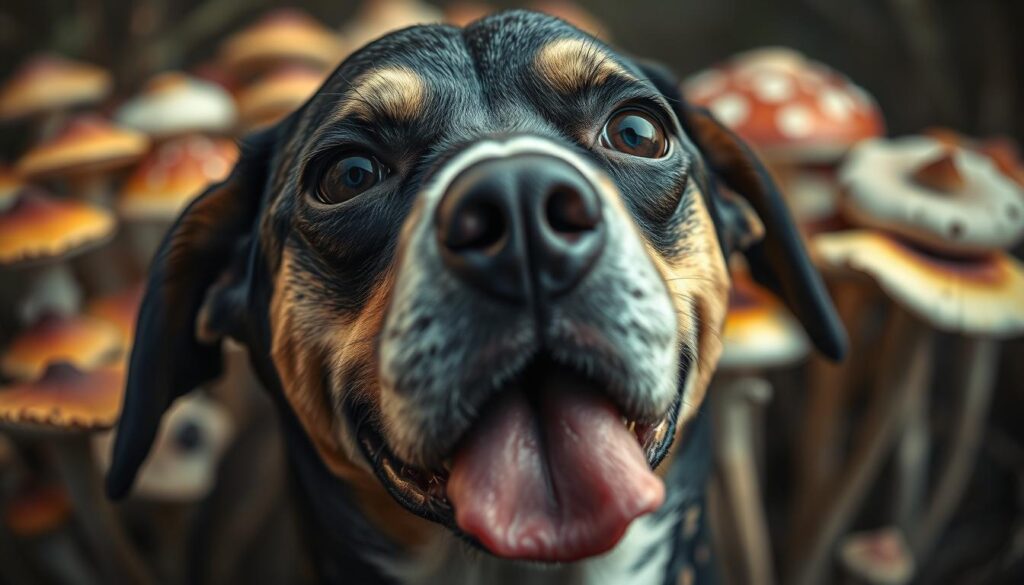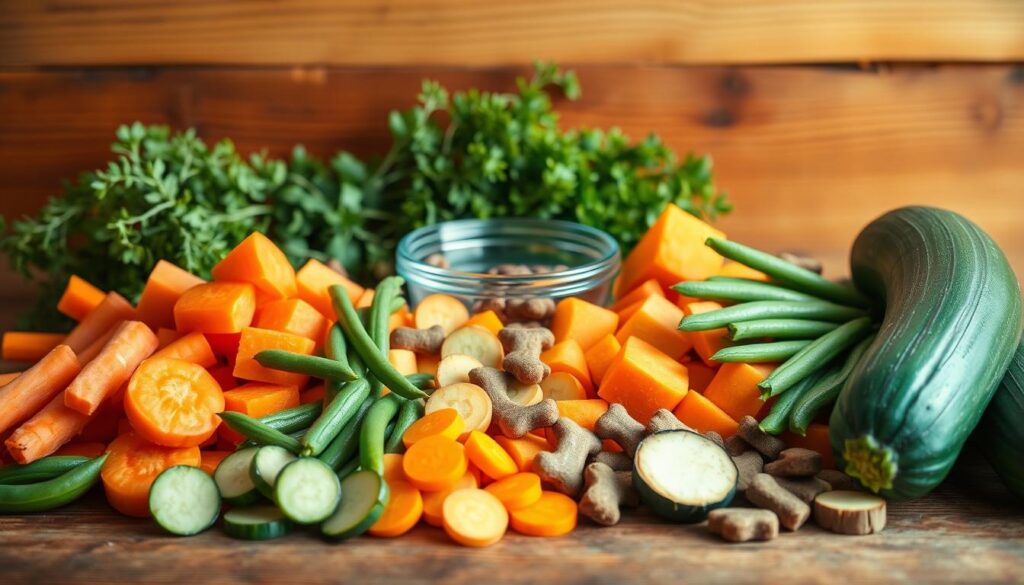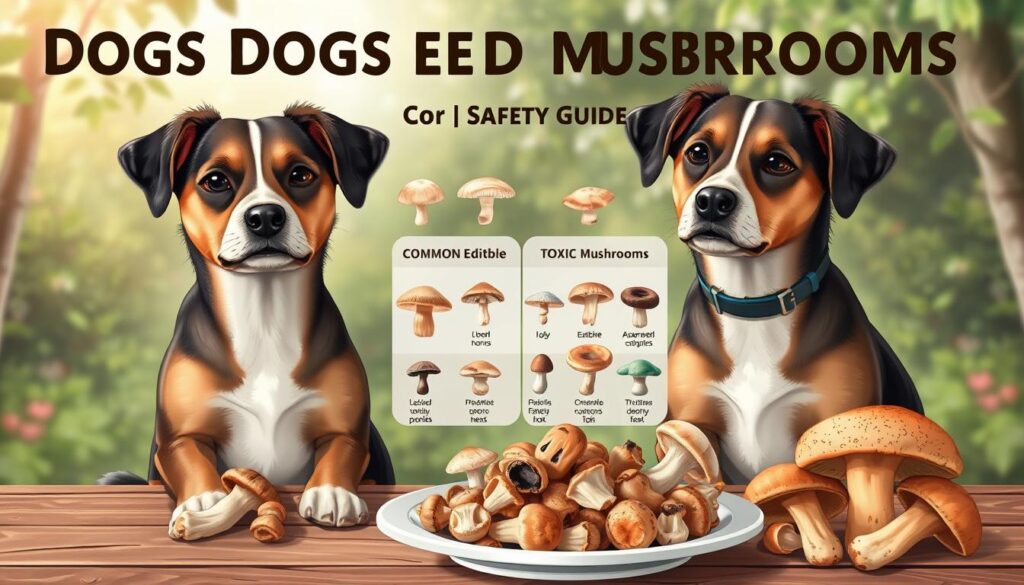Table of Contents
Can Dogs Have Cooked Mushrooms?
As a devoted dog parent, I’ve always wondered about the foods I share with my furry companion. One question that frequently crosses my mind is whether dogs can have cooked mushrooms safely. The world of canine nutrition can be complex, especially when exploring foods beyond traditional dog treats.
Understanding are mushrooms safe for dogs requires careful research and expert guidance. Store-bought mushrooms might seem harmless, but not all varieties are created equal. Your dog’s health and safety depend on making informed dietary choices that support their nutritional needs.
This guide will explore the nuanced world of can dogs have cooked mushrooms, providing you with comprehensive insights into safe feeding practices. We’ll dive deep into mushroom varieties, potential health benefits, and critical precautions to protect your four-legged friend.
Key Takeaways
- Not all mushrooms are safe for dogs to consume
- Store-bought mushrooms are generally safer than wild varieties
- Cooking methods and seasoning matter for dog-friendly mushrooms
- Moderation is crucial when introducing new foods
- Always consult with a veterinarian before dietary changes
- Watch for potential allergic reactions or digestive issues
- Nutritional benefits vary between mushroom types
Understanding Dog Nutrition and Mushrooms
When thinking about your dog’s diet, nutrition is key to their health. Dog-friendly mushrooms can be tricky to understand and need careful research.
Dogs need different foods than humans. They require high-quality protein, important vitamins, and balanced minerals. While some mushrooms are good for them, not all are safe.
The Basics of Dog Diet
A good dog diet includes:
- High-quality animal protein
- Moderate fat content
- Essential amino acids
- Vitamins and minerals
Nutritional Value of Mushrooms
Certain mushrooms are good for dogs. Culinary mushrooms like shiitake and white button mushrooms have:
- Protein
- Fiber
- B vitamins
- Selenium
Risks of Feeding Mushrooms to Dogs
Not all mushrooms are safe for dogs. Toxic mushrooms can harm their health. Wild mushrooms are especially risky and should never be given to dogs without a vet’s okay.
Always consult your veterinarian before introducing new foods to your dog’s diet.
To understand mushrooms’ benefits and risks, you need to do research and get advice from experts. This ensures your dog stays safe and gets the nutrients they need.
Are All Mushrooms Safe for Dogs?
Feeding mushrooms to pets is a big deal. Knowing which ones are safe and which can harm your dog is key. Not all mushrooms are safe for dogs.
Dogs need different foods than humans. This means picking the right mushrooms for them is very important. Some mushrooms are good, while others are very bad.
Distinguishing Safe from Toxic Mushrooms
It’s important to know the difference between safe and toxic mushrooms for pets:
- Safe Cultivated Mushrooms:
- White button mushrooms
- Cremini mushrooms
- Portobello mushrooms
- Shiitake mushrooms
- Toxic Wild Mushrooms:
- Death cap mushrooms
- Fly agaric mushrooms
- Deadly webcap mushrooms
Common Edible Mushrooms for Dogs
Some mushrooms grown for people can be good for dogs too. But, they must be prepared right. Here’s what you need to know:
| Mushroom Type | Nutritional Benefits | Preparation Method |
|---|---|---|
| White Button Mushrooms | Low calories, high in antioxidants | Cooked, unseasoned |
| Shiitake Mushrooms | Supports immune system | Lightly cooked, no added salt |
| Portobello Mushrooms | Rich in protein and minerals | Plain, thoroughly cooked |
To keep your dog safe from mushroom poisoning, choose and prepare mushrooms carefully. Always talk to your vet before adding new foods to your dog’s diet. Watch for any signs of trouble.
Remember: When in doubt, leave it out. Your dog’s safety is always the top priority.
The Benefits of Cooked Mushrooms for Dogs
Looking into safe human foods for dogs can boost their nutrition. Cooked veggies, like mushrooms, bring health perks that many pet owners don’t know about.
Mushrooms are a nutritional powerhouse for dogs. When cooked right, they offer key nutrients that help keep your dog healthy.
Nutrient Powerhouse in Mushrooms
Various mushroom types have amazing nutritional benefits for dogs:
- Rich in antioxidants like ergothioneine
- Provide vitamin D2 when exposed to UVB light
- Contain beta-glucans that support immune function
Potential Health Benefits
Adding cooked mushrooms to your dog’s diet can bring several health benefits:
| Health Benefit | Description |
|---|---|
| Immune Support | Beta-glucans help strengthen immune responses |
| Anti-Inflammatory | Antioxidants reduce cellular inflammation |
| Cardiovascular Health | Nutrients support heart function and circulation |
Always consult your veterinarian before introducing new foods to your dog’s diet.
Risks of Feeding Dogs Cooked Mushrooms
Cooked mushrooms might seem safe, but they can be risky for dogs. Adding new foods to your dog’s diet can cause unexpected problems. This is especially true for mushroom toxicity in dogs.
Dogs can have bad reactions to mushrooms. It’s important to know these risks to keep your pet safe.
Allergic Reactions in Dogs
Some dogs may get allergic to mushrooms. This can show in different ways:
- Skin irritation or itching
- Swelling around the face or mouth
- Hives or rashes
- Difficulty breathing
Digestive Complications
Mushrooms can upset a dog’s stomach. The problems include:
- Stomach upset
- Vomiting
- Diarrhea
- Abdominal pain
The bad reactions depend on the dog and the mushroom type. Always watch your pet when trying new foods.
Veterinary experts say to introduce new foods slowly and in small amounts. This helps avoid bad reactions.
If your dog shows odd symptoms after eating mushrooms, call your vet right away. Quick help can stop serious problems from mushroom toxicity in dogs.
How to Prepare Cooked Mushrooms for Dogs
Preparing mushrooms for dogs needs careful attention. Not all mushrooms are safe, but cooked ones can be good for them. It’s important to cook them right to make them safe and nutritious.
When thinking about can dogs have cooked mushrooms, it’s key to follow certain steps. This ensures your pet’s safety and gets them the most nutritional benefits.
Proper Cooking Techniques
To make mushrooms safe for dogs, use these cooking methods:
- Cook mushrooms at a minimum of 200°F for 10-15 minutes
- Use plain cooking methods like steaming or boiling
- Avoid adding oils or butter
- Chop mushrooms into small, bite-sized pieces
Safe Seasoning Recommendations
When preparing mushrooms for dogs, keep the seasoning simple:
- Never use salt, garlic, or onion
- Stick to plain, unseasoned mushrooms
- Introduce small amounts gradually
- Watch for any adverse reactions
Remember, while some mushrooms are good, don’t overdo it. Always talk to your vet before adding new foods to your dog’s diet.
Pro tip: Start with small quantities of cooked mushrooms to assess your dog’s tolerance and potential allergic reactions.
Signs of Mushroom Poisoning in Dogs
Canine mushroom poisoning is a serious issue for dogs. It’s important to know the early signs of mushroom poisoning in dogs. This helps keep your dog safe and ensures they get the right medical care quickly.

Dogs can show different symptoms when they eat toxic mushrooms. The symptoms depend on the mushroom type and how much they ate.
Common Symptoms to Watch For
- Sudden and persistent vomiting
- Watery or bloody diarrhea
- Severe abdominal pain and cramping
- Unexplained weakness or lethargy
- Yellowing of the eyes or skin (signs of liver damage)
- Neurological symptoms like seizures or tremors
- Excessive drooling
- Rapid heart rate
Immediate Actions to Take
If you think your dog ate toxic mushrooms, act fast:
- Remove any mushrooms from your dog’s reach
- Do not induce vomiting unless a vet tells you to
- Collect a mushroom sample if you can for identification
- Call your vet or an animal poison control center right away
- Watch your dog’s symptoms and behavior closely
Acting quickly and getting professional help is key in treating mushroom poisoning in dogs. Your vet can give the right treatment based on the mushroom type and your dog’s symptoms.
Consulting Your Veterinarian
When it comes to your dog’s diet, getting expert advice is key. This is especially true when thinking about giving them mushrooms. Your vet is there to help keep your dog healthy and safe.
There are important times when you need to talk to a vet about your dog’s food:
- When introducing new foods to their diet
- Managing health issues they already have
- When worried about mushroom risks
- Understanding what food is best for them
When to Seek Professional Advice
Vets say you should see them right away if your dog eats mushrooms. This is true for:
- When they eat wild mushrooms
- If they have an allergic reaction to mushrooms
- If they have ongoing stomach problems after eating new foods
- If they have health issues that could be affected by mushroom nutrients
Preparing Questions for Your Vet
Before you go to the vet, make a list of questions. Talking openly helps get the best food advice for your dog.
Your vet is your best friend in keeping your dog healthy and safe.
Ask about different mushrooms, how much to give, and how to prepare them. Also, talk about how mushrooms might affect your dog based on their breed, age, and health history.
Alternatives to Mushrooms in Dog Diets
Looking for safe foods for your dog? There are many nutritious options besides mushrooms. Cooked vegetables are great for your dog’s health and can add variety to their diet.

Dogs need a balanced diet with lots of nutrients. While mushrooms are good, other veggies offer similar benefits. They can make your dog’s meals more interesting and healthy.
Nutritious Vegetable Options for Dogs
- Carrots: Packed with beta-carotene and fiber
- Green beans: Low-calorie and rich in vitamins
- Sweet potatoes: Excellent source of vitamin A
- Pumpkin: Supports digestive health
- Spinach: Provides iron and antioxidants
Balancing Your Dog’s Nutrition
Here’s how to add cooked veggies to your dog’s diet:
- Start with small portions
- Cook vegetables thoroughly
- Avoid seasoning or added salt
- Monitor your dog’s reaction
- Consult with your veterinarian
Remember, veggies should not replace their regular dog food. Every dog is different, so getting advice from a vet is important.
Variety is the key to a healthy canine diet. Rotate different safe human foods to provide a range of nutrients and keep mealtime interesting for your dog.
Final Thoughts on Feeding Dogs Cooked Mushrooms
Understanding what to feed your dog can be tricky, especially with mushrooms. Dogs need a balanced diet, and mushrooms are no exception. Not all mushrooms are safe for dogs.
Is it safe to give mushrooms to dogs? It depends on several things. Vets say to start with small amounts of new foods. Mushrooms like white button or shiitake might be good, but only if cooked right. Always stick to your dog’s main food, which should be a balanced dog food.
Remember, moderation is important when giving mushrooms to dogs. Choose plain, cooked mushrooms without any seasonings. Stay away from wild mushrooms because they can be harmful. Your vet can give you the best advice for your dog’s diet.
Being a good pet owner means knowing what to feed your dog. Mushrooms should be a rare treat, not a regular part of their diet. Watch how your dog reacts to new foods. If they seem sick, stop giving them that food right away.
FAQ
Are all mushrooms safe for dogs to eat?
No, not all mushrooms are safe for dogs. Some mushrooms like white button, shiitake, and portobello are okay when cooked. But, wild mushrooms can be very toxic and even deadly. Always check with your vet and avoid wild mushrooms.
Can I feed my dog cooked mushrooms from the grocery store?
Some store-bought mushrooms are safe for dogs when cooked plain. But, make sure they don’t have garlic, onions, or too much salt. Start with a little bit and watch for any bad reactions.
What are the potential health benefits of mushrooms for dogs?
Mushrooms can be good for dogs. They have antioxidants, beta-glucans for the immune system, and nutrients like selenium and potassium. They might help with heart health and inflammation, if cooked right.
How should I prepare mushrooms for my dog?
To prepare mushrooms for your dog, wash them well. Remove stems and tough parts. Cook them plain without any extras. Steaming or boiling is best. Cut them small to avoid choking and serve in small amounts.
What are the signs of mushroom poisoning in dogs?
Poisoning signs include vomiting, diarrhea, and stomach pain. Dogs might also feel very tired, have seizures, or turn yellow. If you think your dog ate bad mushrooms, call your vet right away. Try to save a mushroom sample for them.
How many mushrooms can I safely feed my dog?
Mushrooms should be a rare treat, not a regular food. Start with 1-2 small pieces for small dogs and 3-4 for big dogs. Watch for any bad reactions and talk to your vet about how much is safe for your dog.
Can mushrooms cause allergic reactions in dogs?
Yes, dogs can be allergic to mushrooms. Signs include itching, rashes, upset stomach, or breathing problems. Introduce new foods slowly and watch for allergic signs. If you see any, stop feeding them and talk to your vet.
Are wild mushrooms more dangerous than store-bought mushrooms?
Wild mushrooms are much more dangerous and can be deadly. They have toxins that can harm the liver and brain. Always keep your dog away from wild mushrooms and get vet help if they eat any.
Should I consult my veterinarian before feeding my dog mushrooms?
Yes, definitely. Your vet can give advice based on your dog’s health, age, and diet. They can tell you if mushrooms are good for your dog and how to prepare and serve them safely.
There are no reviews yet. Be the first one to write one.

